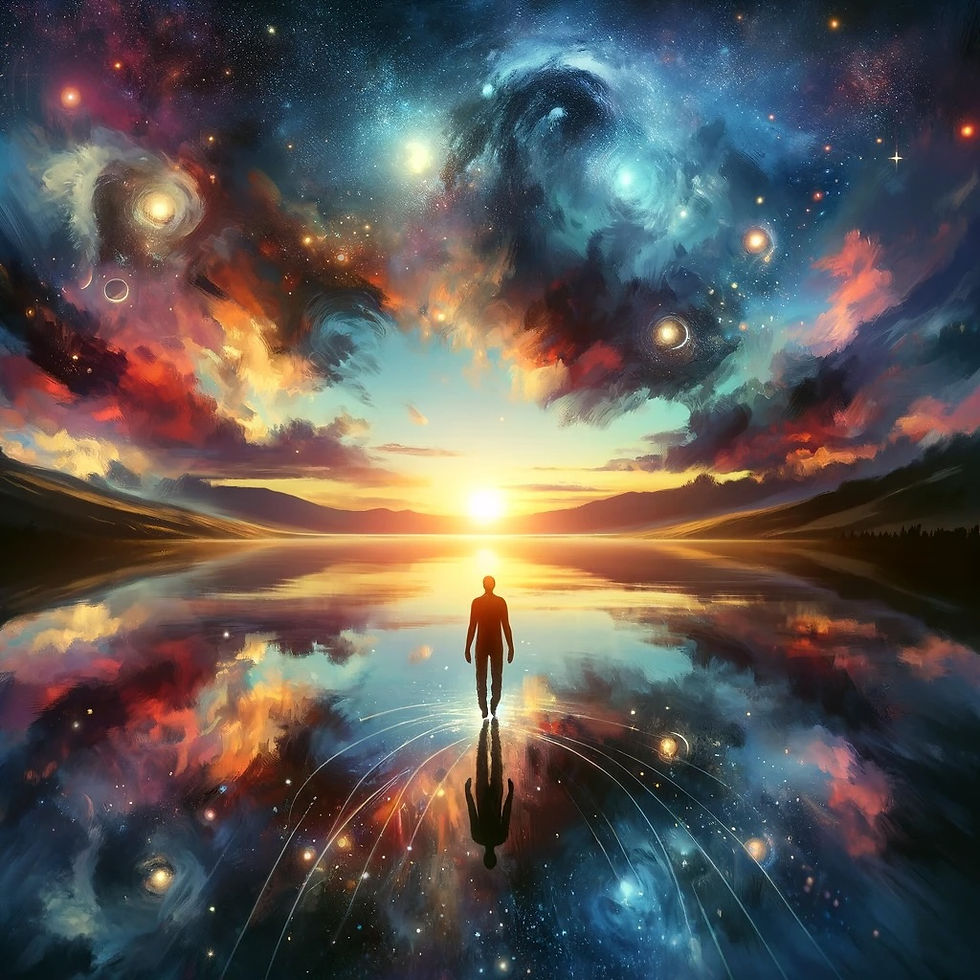The Search for Identity
- Brain Dumps

- Feb 10, 2024
- 4 min read
Updated: Jul 31, 2025
I have been pondering about this brain dump for so long now that I might as well try to enable some flow by dumping what I have, whatever that is; I might go back to this in the future perhaps. Also, in some way, this is the first brain dump where I try to expand on direct feedback I received a long time ago. This feedback has been sitting in my head for so long now that it is not clear to me whether the focus of this post is driven by that feedback or by the underlying concepts that I always wanted to write about.
In the post “Perception, awareness and consciousness” I wrote that it was my understanding that 'consciousnesses' is what makes an individual unique. In that post, I also wrote that awareness is a necessary condition for consciousness. I am not entirely sure of that anymore and the reason for that is because of "dissociation", the detachment from physical reality.
I am not thinking here in terms of pathological dissociation, potentially triggered by PTSD. Many things in nature and life are on a continuum so I am taking a more subtle stance on this, to "experiment" with some reasoning. To some extent, many of us might experience mild dissociation in daily experiences. One example. I am driving to work and because I am very familiar with the route I am in "auto-pilot" mode: my mind starts to wander and for a brief moment I get detached from what is happening around me, only to jump back in when necessary, and hopefully not too late. Am I aware? Probably not entirely, since it takes a fraction of a second to return to reality. I would claim, however, that I am conscious and this would invalidate awareness as a necessary condition for consciousness.
What happens during sleep? Eyes are closed, muscles are relaxed and brain activity is greatly altered. Awareness, which is tightly coupled with perception (i.e. sensory information), is reduced. One person can still be awakened by external stimuli, like a loud sound, although this takes longer than the previous example (mild dissociation when driving). When sleep progresses into deeper phases, consciousness is practically suspended. Does this mean that a sleeping person stops being that particular individual? Most certainly not. It seems, therefore, that I need to revisit also my claim that 'consciousnesses’ is what makes an individual unique.
Since I am not a native English speaker, it is good for me to go back sometimes to the definitions of words. According to Google, which builds on top of Oxford Languages:
Awareness - Knowledge or perception of a situation or fact.
and
Consciousnesses - The state of being aware of and responsive to one's surroundings.
Just as an experiment, if I had to play around with definitions I would write them as:
Awareness - Perception of physical reality.
and
Consciousnesses - The state of being aware of, and interacting with, physical reality.
I am aware (pun intended) that I made quite some major changes in those definitions.
Firstly, I left knowledge out of the definition of awareness because I think that, in some way, that is already covered. Empiricism claims that all knowledge comes from sensory information (i.e. perception). Rationalism claims that knowledge comes from thinking. In the same post I referenced at the beginning of this brain dump, I wrote that thoughts usually emerge. Can thoughts emerge without perception (i.e. senses)? To some extent, probably yes, but only if some memory is already present. And how was memory created in the first place? This is a question that can easily take another brain dump by itself.
Secondly, in the definition of consciousness, I changed "being responsive" to "interacting". Although I am not a native English speaker, to me the concept of "responsiveness" intrinsically implies somewhat of a "passive" behavior and I don't think that a conscious human being can ever be passive to physical reality. One always interacts with what we define as physical reality and, even if one isolates oneself, there is always some interaction with the environment: deciding not to communicate at all conveys a message as well.
At this point, I might as well integrate the feedback I received some time ago, and that is that "consciousness could be seen as the rationalization of awareness". This is a very interesting idea and, if I had to take a reductionist approach, considering what I wrote in this last paragraph, I would say that:
Consciousness is a state that emerges from perception.
As I am looking for a way to close this brain dump, I cannot help but go back to the point that was made in the post “Perception, awareness and consciousness”: choices are what defines an individual. While I agree that this is true, I still think there is something more fundamental that defines an individual. For the moment, my experience brings me to think that "needs" and "desires" are deep values that define an individual (identity). I don't know what will follow from this post but I will close with a quote from the Welsh-born poet George Herbert – “To him that will, ways are not wanting”, commonly known in the form of the modern saying "Where there is a will there is a way".
Edit. Adding to this post: "One of the few places that you can really have a bit of a handle on what consciousness is, is what turns it off. And when you are thinking about general anesthetic it's very specific, these things turn consciousness off." [Roger Penrose, ref].




